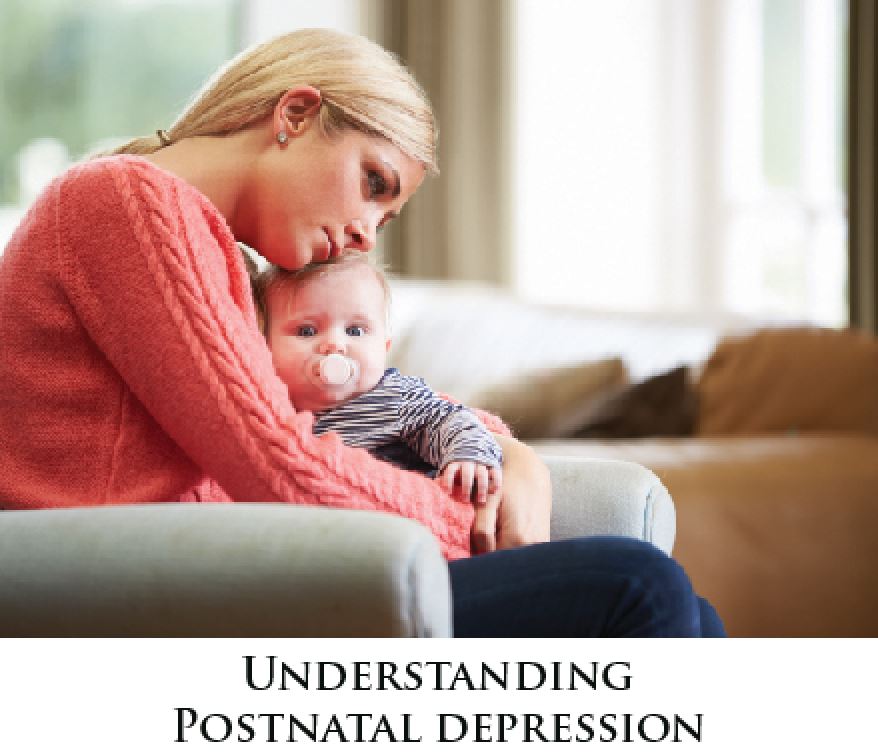Understanding Post-Natal Depression

Suffering in silence is something many women with post-natal depression do, and for many different reasons. Perhaps the mum doesn’t want to admit that she is not coping; fear of the baby being taken away; stigma, or maybe just not recognising that the symptoms she is experiencing after giving birth to her baby could be post-partum depression. There is also a vast array of symptoms, ranging from anxiety to not sleeping or eating properly to not wanting to leave the house.
Madge Fogarty, Chair of PND Ireland, wrote a book called Recovering from PND after she suffered from the illness following the birth of her second son 20 years ago. She talked to Network Magazine how the illness can manifest.
‘Around 6 to 12 weeks after you have your baby is the most common time for PND but 1% to 2 % have it directly after birth. It’s when the mum is down, anxious and not sleeping, crying at the drop of a hat, finding it hard to cope and make decisions, and get out of bed. Everything seems tremendously hard. Normal things a woman would be able to do become mountains. The anxiety is terrible and there is no let up from it. That’s one of the worst symptoms. People think that with PND you are going to be crying all the time but it’s all the other things as well. It can happen after any pregnancy. I just spoke to a lady who had her third child and she has had PND on all of them’.
Typically if you have PND on one pregnancy, there is a higher chance of getting it the next time round. However Madge points out that she knows of several women who didn’t get it on subsequent pregnancies.
There are many contributing factors to women developing PND but Madge believes it is a combination of factors that can trigger it. These include hormonal changes, family history of depression or PND, and lack of support. She says nowadays most women work right up until the baby is born and suddenly, when the baby comes, they are left at home and have few friends around for that social interaction. Therefore she encourages women to get involved in a mother and baby group as soon as possible after giving birth. There is another major contributing factor to PND and it’s one that most women cannot escape: sleep deprivation.
‘Sleep deprivation is a form of torture so it’s important to try to get one decent night’s sleep a week. It stands to you. Also, exercise is important. Lots of women might go running or to a gym and then the baby comes and it stops. Often people forget what they did before and if our body is used to lots of extra oxygen then it reacts to that. It’s important to get some form of exercise’ Madge advises.
Often times PND can go undiagnosed, especially if it is a mild case however Madge warns that if it is not dealt with properly, symptoms can return on a second pregnancy. The main treatment for PND is antidepressants and counselling/therapy.
‘None of us like taking them (antidepressants) but they have come on a lot and are a lot better than they used to be. If the depression is mild, counselling might be enough. Some women do both. Support is a hugely important thing for the mum too’.
Madge advises women who might be suffering to go to their GP and also to support meetings.
One major reason women might be reluctant to take medication is due to the fact they are breast feeding. Numerous medicines are contraindicated whilst breast feeding however Madge recommends women speak to their GP in relation to this. She also feels that most women aren’t prepared for motherhood, especially the first time around. ‘Very few women sit down and think, I’m responsible for this small baby. It’s a huge cultural change. There isn’t enough preparation’.
She recommends women make up a list of things they like to do prior to the baby’s arrival, as oftentimes, under-slept and overworked mums forget when they’re in distress. ‘It’s important to push yourself to do some of the things you love again’ she says.
Madge’s story of recovery after PND
It was 20 years ago, after my second baby. I was fine on the first. I had a traumatic birth but it crept up on me. I was induced and I reacted badly to the drugs. They wouldn’t give me the epidural and said we had to wait for the contractions to be established.
There was one contraction on top of another, on top of another and the baby was coming but the midwife thought I was being dramatic. I barely made it to the delivery room. I thought I was going to die but was being told to pull myself together.
It was 6 weeks after he was born that I had symptoms. I was very anxious. I hadn’t slept for a full week, was afraid to face the day and everything felt very black with no light at the end of the tunnel. I went to my GP and went on antidepressants. I went at 6 weeks but it was building up for around 3 weeks. I had to stop breast feeding too.
The doctor never told me I’d feel worse before I’d feel better so I was taking them and feeling a hundred times worse. In those days there was no information and I found that the hardest. I knew the name (PND) but didn’t know anything about the symptoms and didn’t know how long it was going to last or how I could help myself. That’s vital. I asked my GP what should I do to help myself and he answered, do whatever makes you feel good. But when you’re feeling bad, you have no idea what makes you feel good. I had no support. Neither of our families were in Cork and we had moved to a new area. All the things you shouldn’t do with a new baby.
After the birth, nobody talked to me or explained what happened. I think debriefing after birth is so important. Someone to sit down and give you ten minutes and asks if you have any questions. It took me a long time to get better, over six to nine months. It’s a lot of missing out on the child so it’s important not to delay and get help before it gets more of a grip on you.
Latest Issue
Upcoming Events
-
17/04/2020 to 26/04/2020
-
18/04/2020
-
23/04/2020
-
15/05/2020 to 23/05/2020
-
16/05/2020 to 17/05/2020
Recent Articles
Article Archive
- November 2011 (2)
- January 2012 (3)
- February 2012 (2)
- March 2012 (2)
- April 2012 (4)
- May 2012 (4)
- June 2012 (1)
- July 2012 (3)
- August 2012 (2)
- October 2012 (2)

